HRM and Employee Relations: France vs Pakistan
VerifiedAdded on 2019/09/16
|13
|3495
|357
Essay
AI Summary
This essay provides a comparative analysis of Human Resource Management (HRM) and Employee Relations (ER) practices between France, a developed nation, and Pakistan, a less developed nation. It delves into the differences in their labor laws, control and regulations, and overall HRM systems. The essay highlights the well-structured HRM system in France, characterized by strong legal frameworks and employee protections, contrasting it with the less organized and often exploitative labor practices in Pakistan. The analysis covers aspects such as collective bargaining, wage agreements, working conditions, and the role of labor unions, revealing significant disparities in how employees are managed and protected in these two countries. The conclusion emphasizes the need for Pakistan to improve its labor laws and HRM practices to ensure fair treatment and better working conditions for its workforce.
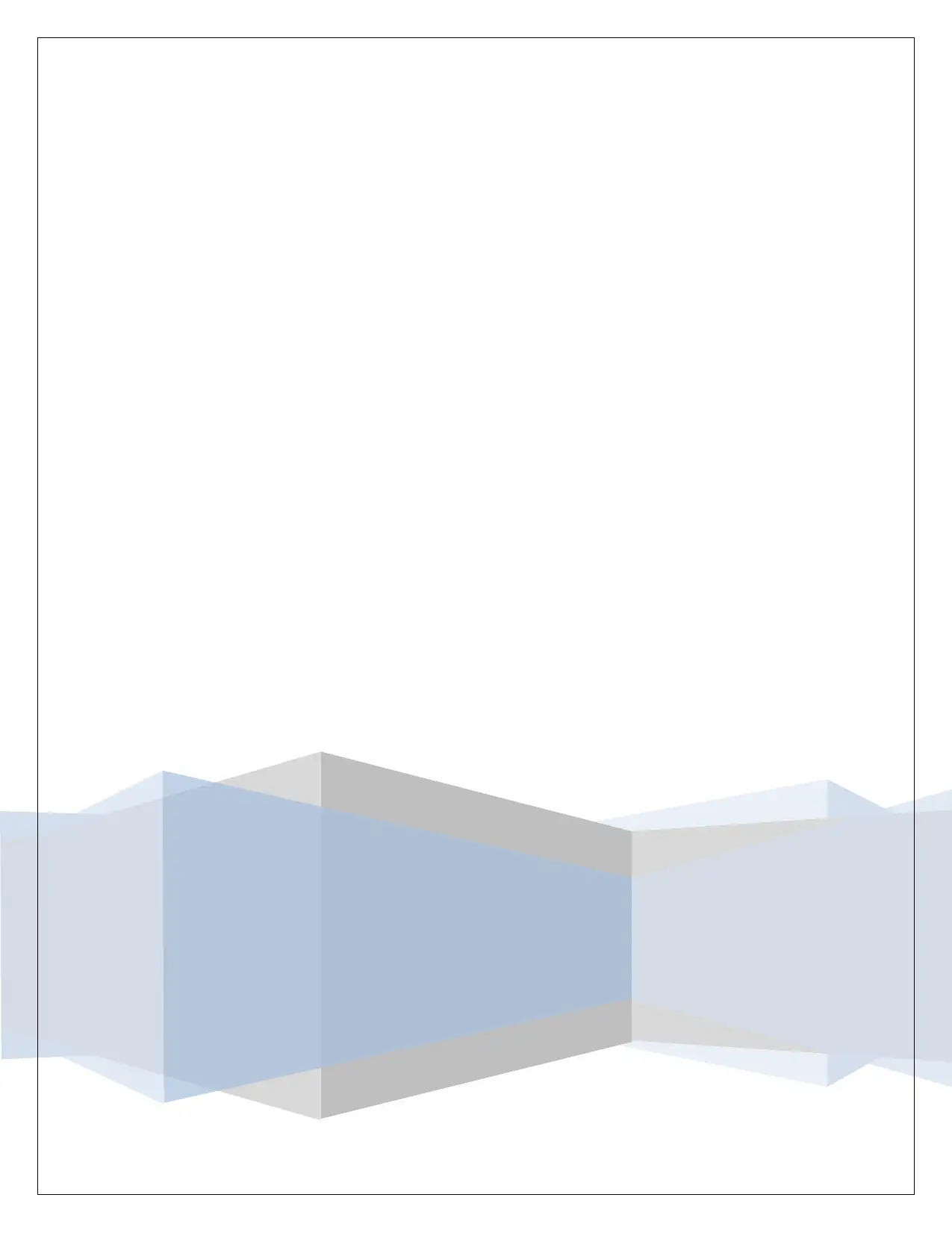
Paraphrase This Document
Need a fresh take? Get an instant paraphrase of this document with our AI Paraphraser
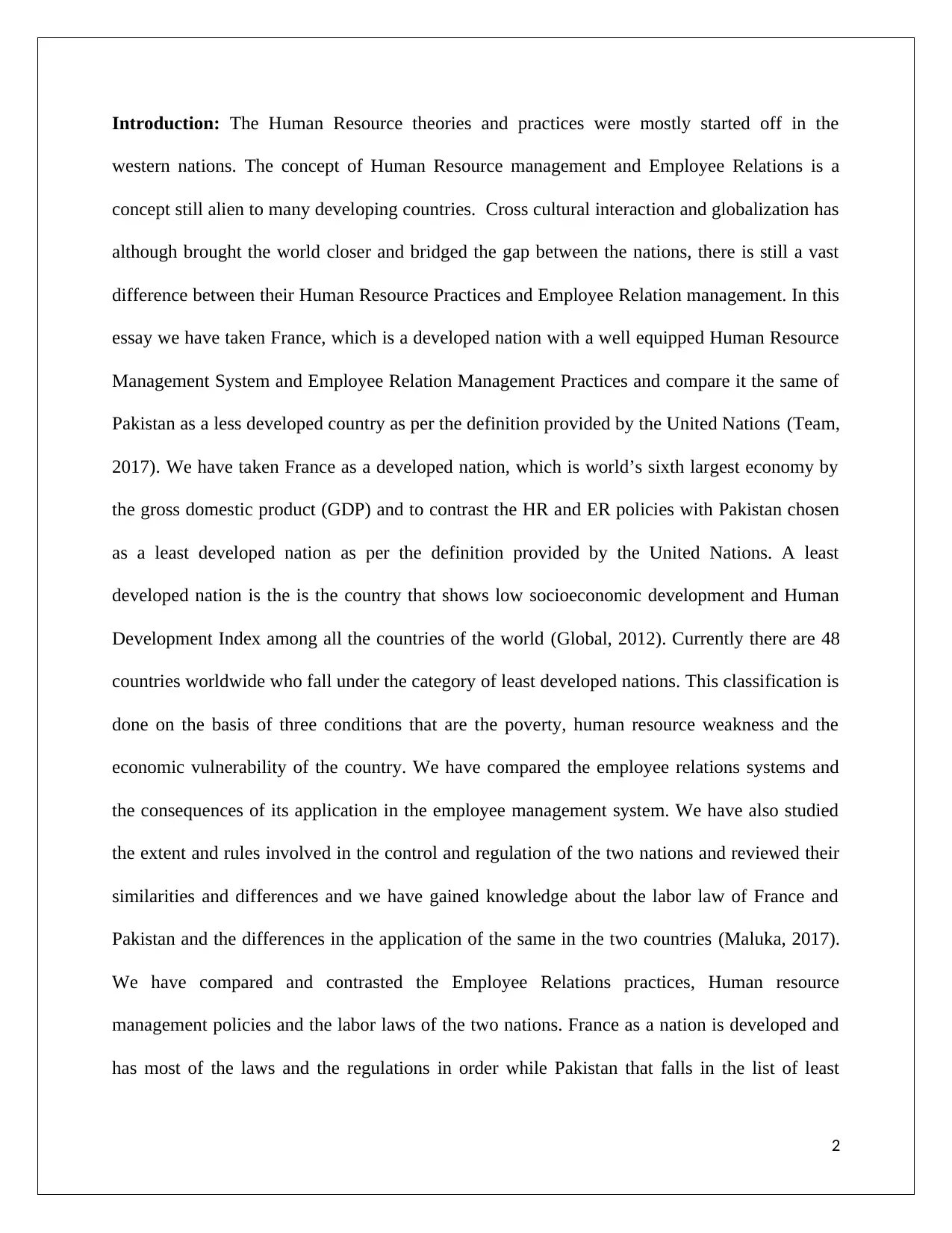
Introduction: The Human Resource theories and practices were mostly started off in the
western nations. The concept of Human Resource management and Employee Relations is a
concept still alien to many developing countries. Cross cultural interaction and globalization has
although brought the world closer and bridged the gap between the nations, there is still a vast
difference between their Human Resource Practices and Employee Relation management. In this
essay we have taken France, which is a developed nation with a well equipped Human Resource
Management System and Employee Relation Management Practices and compare it the same of
Pakistan as a less developed country as per the definition provided by the United Nations (Team,
2017). We have taken France as a developed nation, which is world’s sixth largest economy by
the gross domestic product (GDP) and to contrast the HR and ER policies with Pakistan chosen
as a least developed nation as per the definition provided by the United Nations. A least
developed nation is the is the country that shows low socioeconomic development and Human
Development Index among all the countries of the world (Global, 2012). Currently there are 48
countries worldwide who fall under the category of least developed nations. This classification is
done on the basis of three conditions that are the poverty, human resource weakness and the
economic vulnerability of the country. We have compared the employee relations systems and
the consequences of its application in the employee management system. We have also studied
the extent and rules involved in the control and regulation of the two nations and reviewed their
similarities and differences and we have gained knowledge about the labor law of France and
Pakistan and the differences in the application of the same in the two countries (Maluka, 2017).
We have compared and contrasted the Employee Relations practices, Human resource
management policies and the labor laws of the two nations. France as a nation is developed and
has most of the laws and the regulations in order while Pakistan that falls in the list of least
2
western nations. The concept of Human Resource management and Employee Relations is a
concept still alien to many developing countries. Cross cultural interaction and globalization has
although brought the world closer and bridged the gap between the nations, there is still a vast
difference between their Human Resource Practices and Employee Relation management. In this
essay we have taken France, which is a developed nation with a well equipped Human Resource
Management System and Employee Relation Management Practices and compare it the same of
Pakistan as a less developed country as per the definition provided by the United Nations (Team,
2017). We have taken France as a developed nation, which is world’s sixth largest economy by
the gross domestic product (GDP) and to contrast the HR and ER policies with Pakistan chosen
as a least developed nation as per the definition provided by the United Nations. A least
developed nation is the is the country that shows low socioeconomic development and Human
Development Index among all the countries of the world (Global, 2012). Currently there are 48
countries worldwide who fall under the category of least developed nations. This classification is
done on the basis of three conditions that are the poverty, human resource weakness and the
economic vulnerability of the country. We have compared the employee relations systems and
the consequences of its application in the employee management system. We have also studied
the extent and rules involved in the control and regulation of the two nations and reviewed their
similarities and differences and we have gained knowledge about the labor law of France and
Pakistan and the differences in the application of the same in the two countries (Maluka, 2017).
We have compared and contrasted the Employee Relations practices, Human resource
management policies and the labor laws of the two nations. France as a nation is developed and
has most of the laws and the regulations in order while Pakistan that falls in the list of least
2
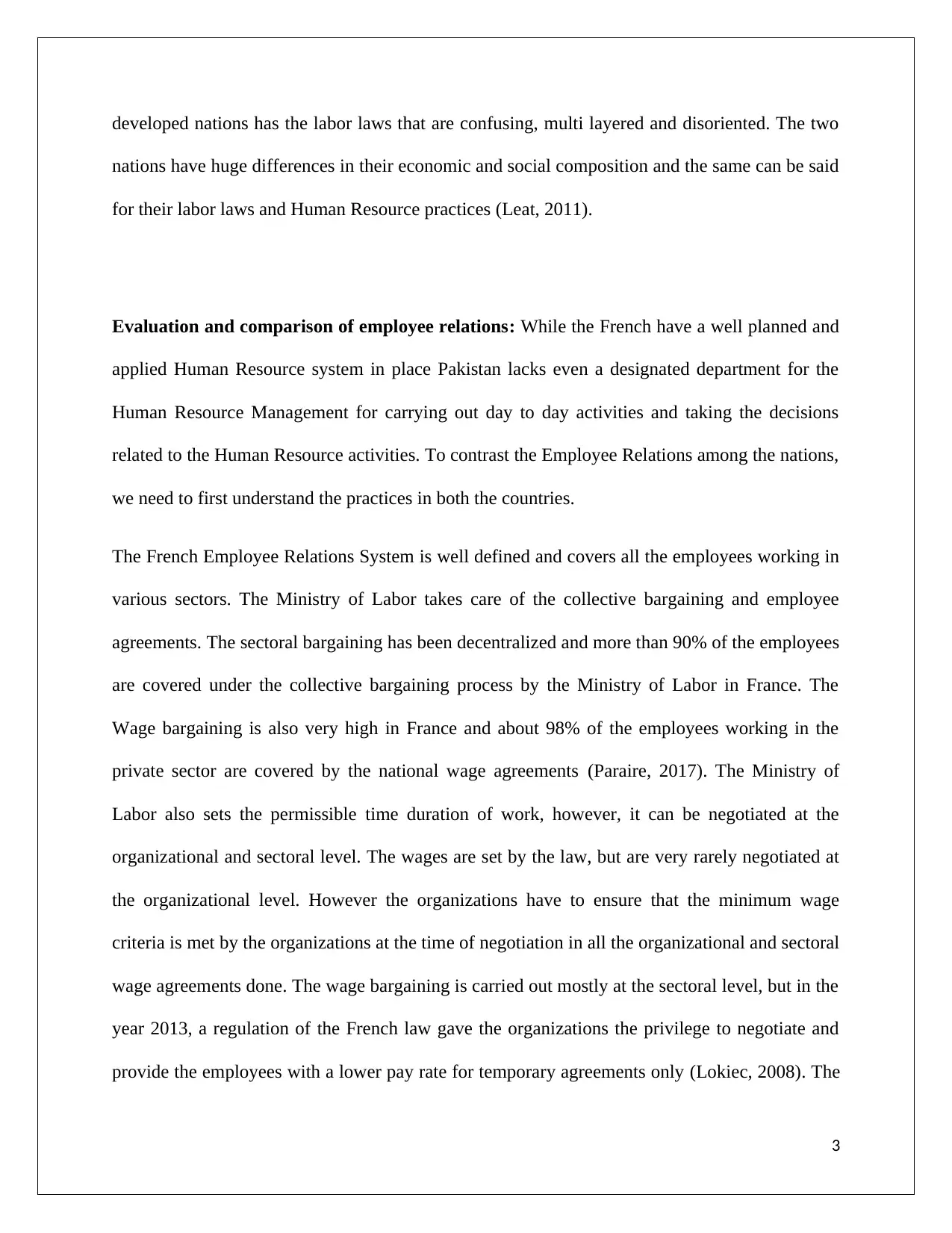
developed nations has the labor laws that are confusing, multi layered and disoriented. The two
nations have huge differences in their economic and social composition and the same can be said
for their labor laws and Human Resource practices (Leat, 2011).
Evaluation and comparison of employee relations: While the French have a well planned and
applied Human Resource system in place Pakistan lacks even a designated department for the
Human Resource Management for carrying out day to day activities and taking the decisions
related to the Human Resource activities. To contrast the Employee Relations among the nations,
we need to first understand the practices in both the countries.
The French Employee Relations System is well defined and covers all the employees working in
various sectors. The Ministry of Labor takes care of the collective bargaining and employee
agreements. The sectoral bargaining has been decentralized and more than 90% of the employees
are covered under the collective bargaining process by the Ministry of Labor in France. The
Wage bargaining is also very high in France and about 98% of the employees working in the
private sector are covered by the national wage agreements (Paraire, 2017). The Ministry of
Labor also sets the permissible time duration of work, however, it can be negotiated at the
organizational and sectoral level. The wages are set by the law, but are very rarely negotiated at
the organizational level. However the organizations have to ensure that the minimum wage
criteria is met by the organizations at the time of negotiation in all the organizational and sectoral
wage agreements done. The wage bargaining is carried out mostly at the sectoral level, but in the
year 2013, a regulation of the French law gave the organizations the privilege to negotiate and
provide the employees with a lower pay rate for temporary agreements only (Lokiec, 2008). The
3
nations have huge differences in their economic and social composition and the same can be said
for their labor laws and Human Resource practices (Leat, 2011).
Evaluation and comparison of employee relations: While the French have a well planned and
applied Human Resource system in place Pakistan lacks even a designated department for the
Human Resource Management for carrying out day to day activities and taking the decisions
related to the Human Resource activities. To contrast the Employee Relations among the nations,
we need to first understand the practices in both the countries.
The French Employee Relations System is well defined and covers all the employees working in
various sectors. The Ministry of Labor takes care of the collective bargaining and employee
agreements. The sectoral bargaining has been decentralized and more than 90% of the employees
are covered under the collective bargaining process by the Ministry of Labor in France. The
Wage bargaining is also very high in France and about 98% of the employees working in the
private sector are covered by the national wage agreements (Paraire, 2017). The Ministry of
Labor also sets the permissible time duration of work, however, it can be negotiated at the
organizational and sectoral level. The wages are set by the law, but are very rarely negotiated at
the organizational level. However the organizations have to ensure that the minimum wage
criteria is met by the organizations at the time of negotiation in all the organizational and sectoral
wage agreements done. The wage bargaining is carried out mostly at the sectoral level, but in the
year 2013, a regulation of the French law gave the organizations the privilege to negotiate and
provide the employees with a lower pay rate for temporary agreements only (Lokiec, 2008). The
3
⊘ This is a preview!⊘
Do you want full access?
Subscribe today to unlock all pages.

Trusted by 1+ million students worldwide
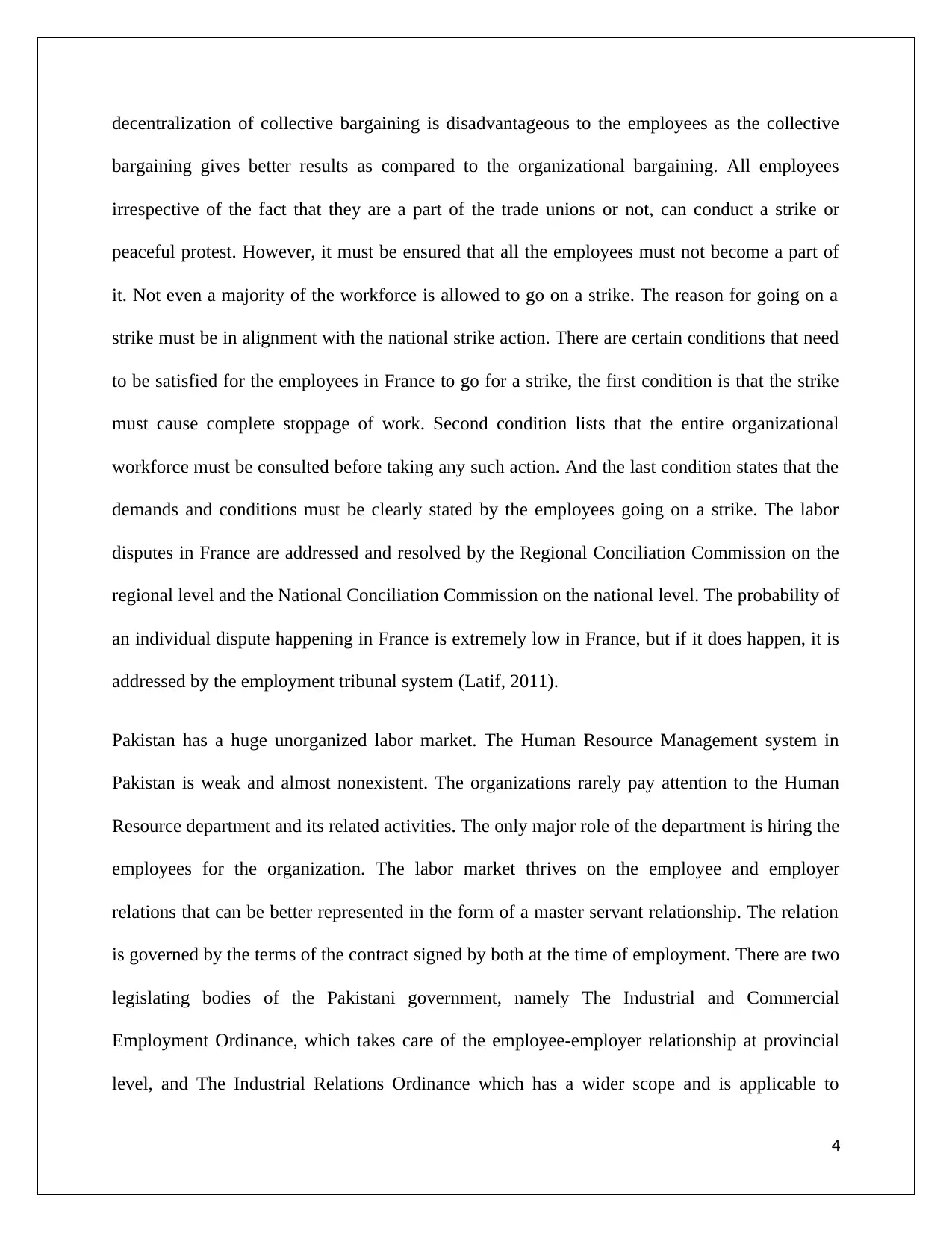
decentralization of collective bargaining is disadvantageous to the employees as the collective
bargaining gives better results as compared to the organizational bargaining. All employees
irrespective of the fact that they are a part of the trade unions or not, can conduct a strike or
peaceful protest. However, it must be ensured that all the employees must not become a part of
it. Not even a majority of the workforce is allowed to go on a strike. The reason for going on a
strike must be in alignment with the national strike action. There are certain conditions that need
to be satisfied for the employees in France to go for a strike, the first condition is that the strike
must cause complete stoppage of work. Second condition lists that the entire organizational
workforce must be consulted before taking any such action. And the last condition states that the
demands and conditions must be clearly stated by the employees going on a strike. The labor
disputes in France are addressed and resolved by the Regional Conciliation Commission on the
regional level and the National Conciliation Commission on the national level. The probability of
an individual dispute happening in France is extremely low in France, but if it does happen, it is
addressed by the employment tribunal system (Latif, 2011).
Pakistan has a huge unorganized labor market. The Human Resource Management system in
Pakistan is weak and almost nonexistent. The organizations rarely pay attention to the Human
Resource department and its related activities. The only major role of the department is hiring the
employees for the organization. The labor market thrives on the employee and employer
relations that can be better represented in the form of a master servant relationship. The relation
is governed by the terms of the contract signed by both at the time of employment. There are two
legislating bodies of the Pakistani government, namely The Industrial and Commercial
Employment Ordinance, which takes care of the employee-employer relationship at provincial
level, and The Industrial Relations Ordinance which has a wider scope and is applicable to
4
bargaining gives better results as compared to the organizational bargaining. All employees
irrespective of the fact that they are a part of the trade unions or not, can conduct a strike or
peaceful protest. However, it must be ensured that all the employees must not become a part of
it. Not even a majority of the workforce is allowed to go on a strike. The reason for going on a
strike must be in alignment with the national strike action. There are certain conditions that need
to be satisfied for the employees in France to go for a strike, the first condition is that the strike
must cause complete stoppage of work. Second condition lists that the entire organizational
workforce must be consulted before taking any such action. And the last condition states that the
demands and conditions must be clearly stated by the employees going on a strike. The labor
disputes in France are addressed and resolved by the Regional Conciliation Commission on the
regional level and the National Conciliation Commission on the national level. The probability of
an individual dispute happening in France is extremely low in France, but if it does happen, it is
addressed by the employment tribunal system (Latif, 2011).
Pakistan has a huge unorganized labor market. The Human Resource Management system in
Pakistan is weak and almost nonexistent. The organizations rarely pay attention to the Human
Resource department and its related activities. The only major role of the department is hiring the
employees for the organization. The labor market thrives on the employee and employer
relations that can be better represented in the form of a master servant relationship. The relation
is governed by the terms of the contract signed by both at the time of employment. There are two
legislating bodies of the Pakistani government, namely The Industrial and Commercial
Employment Ordinance, which takes care of the employee-employer relationship at provincial
level, and The Industrial Relations Ordinance which has a wider scope and is applicable to
4
Paraphrase This Document
Need a fresh take? Get an instant paraphrase of this document with our AI Paraphraser
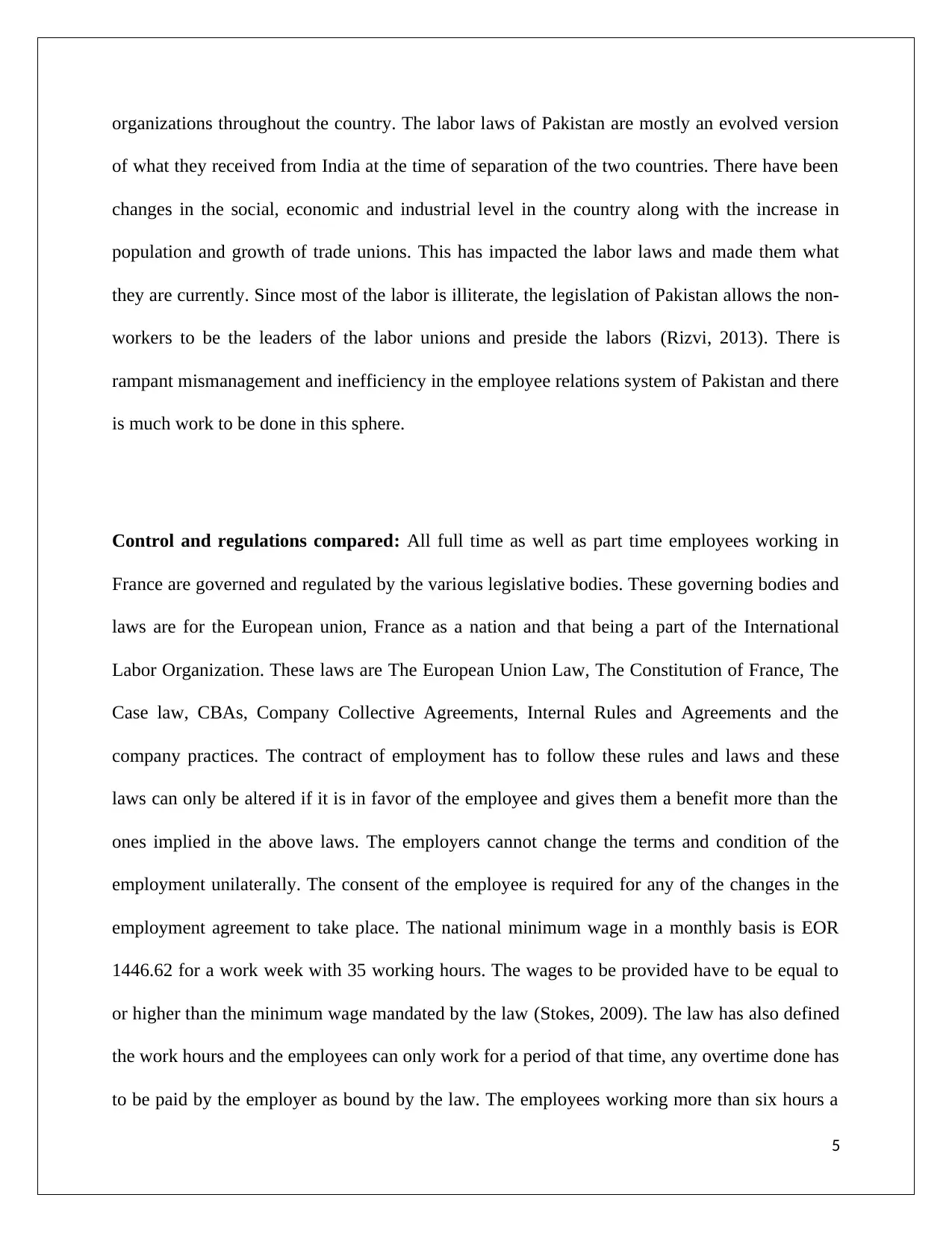
organizations throughout the country. The labor laws of Pakistan are mostly an evolved version
of what they received from India at the time of separation of the two countries. There have been
changes in the social, economic and industrial level in the country along with the increase in
population and growth of trade unions. This has impacted the labor laws and made them what
they are currently. Since most of the labor is illiterate, the legislation of Pakistan allows the non-
workers to be the leaders of the labor unions and preside the labors (Rizvi, 2013). There is
rampant mismanagement and inefficiency in the employee relations system of Pakistan and there
is much work to be done in this sphere.
Control and regulations compared: All full time as well as part time employees working in
France are governed and regulated by the various legislative bodies. These governing bodies and
laws are for the European union, France as a nation and that being a part of the International
Labor Organization. These laws are The European Union Law, The Constitution of France, The
Case law, CBAs, Company Collective Agreements, Internal Rules and Agreements and the
company practices. The contract of employment has to follow these rules and laws and these
laws can only be altered if it is in favor of the employee and gives them a benefit more than the
ones implied in the above laws. The employers cannot change the terms and condition of the
employment unilaterally. The consent of the employee is required for any of the changes in the
employment agreement to take place. The national minimum wage in a monthly basis is EOR
1446.62 for a work week with 35 working hours. The wages to be provided have to be equal to
or higher than the minimum wage mandated by the law (Stokes, 2009). The law has also defined
the work hours and the employees can only work for a period of that time, any overtime done has
to be paid by the employer as bound by the law. The employees working more than six hours a
5
of what they received from India at the time of separation of the two countries. There have been
changes in the social, economic and industrial level in the country along with the increase in
population and growth of trade unions. This has impacted the labor laws and made them what
they are currently. Since most of the labor is illiterate, the legislation of Pakistan allows the non-
workers to be the leaders of the labor unions and preside the labors (Rizvi, 2013). There is
rampant mismanagement and inefficiency in the employee relations system of Pakistan and there
is much work to be done in this sphere.
Control and regulations compared: All full time as well as part time employees working in
France are governed and regulated by the various legislative bodies. These governing bodies and
laws are for the European union, France as a nation and that being a part of the International
Labor Organization. These laws are The European Union Law, The Constitution of France, The
Case law, CBAs, Company Collective Agreements, Internal Rules and Agreements and the
company practices. The contract of employment has to follow these rules and laws and these
laws can only be altered if it is in favor of the employee and gives them a benefit more than the
ones implied in the above laws. The employers cannot change the terms and condition of the
employment unilaterally. The consent of the employee is required for any of the changes in the
employment agreement to take place. The national minimum wage in a monthly basis is EOR
1446.62 for a work week with 35 working hours. The wages to be provided have to be equal to
or higher than the minimum wage mandated by the law (Stokes, 2009). The law has also defined
the work hours and the employees can only work for a period of that time, any overtime done has
to be paid by the employer as bound by the law. The employees working more than six hours a
5
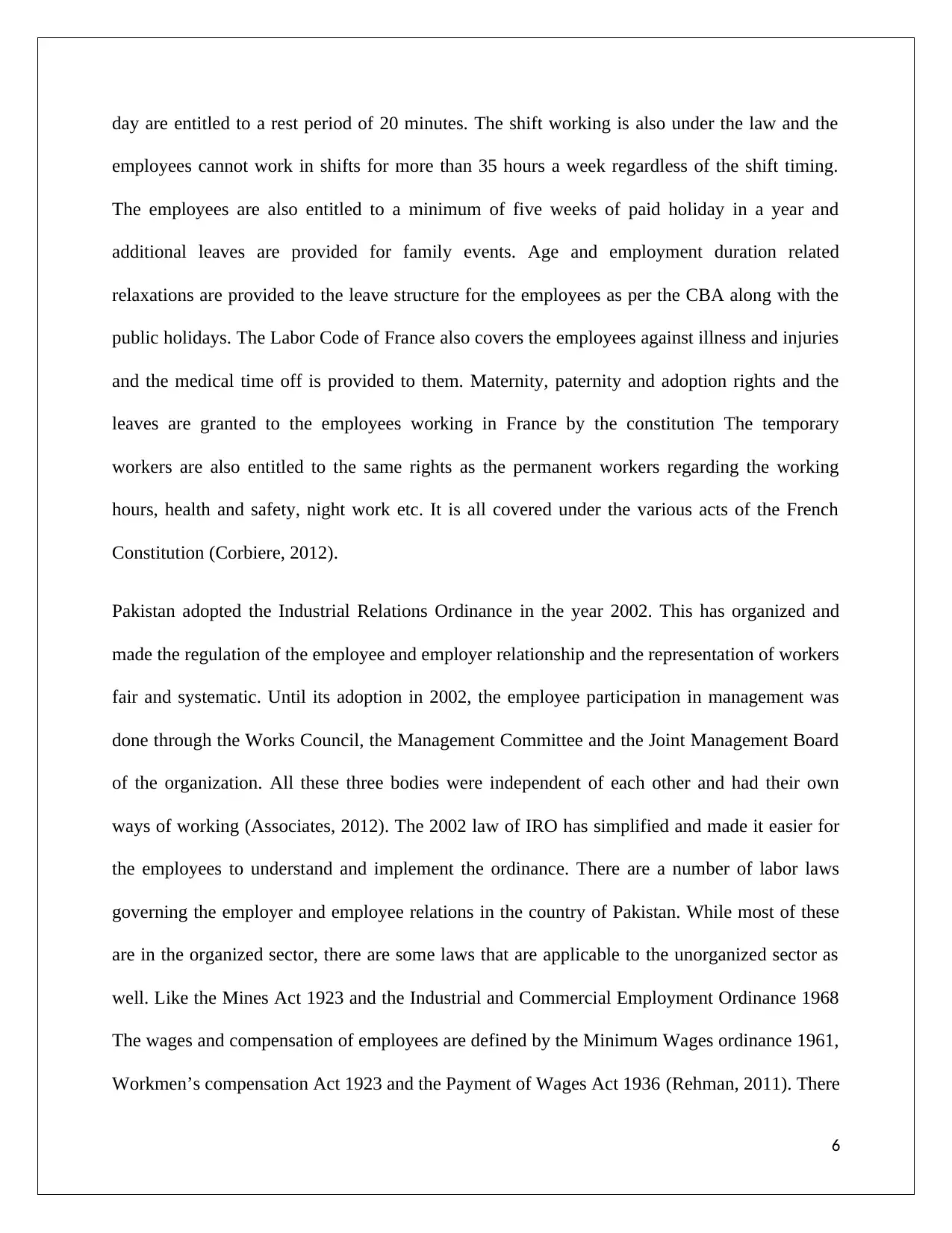
day are entitled to a rest period of 20 minutes. The shift working is also under the law and the
employees cannot work in shifts for more than 35 hours a week regardless of the shift timing.
The employees are also entitled to a minimum of five weeks of paid holiday in a year and
additional leaves are provided for family events. Age and employment duration related
relaxations are provided to the leave structure for the employees as per the CBA along with the
public holidays. The Labor Code of France also covers the employees against illness and injuries
and the medical time off is provided to them. Maternity, paternity and adoption rights and the
leaves are granted to the employees working in France by the constitution The temporary
workers are also entitled to the same rights as the permanent workers regarding the working
hours, health and safety, night work etc. It is all covered under the various acts of the French
Constitution (Corbiere, 2012).
Pakistan adopted the Industrial Relations Ordinance in the year 2002. This has organized and
made the regulation of the employee and employer relationship and the representation of workers
fair and systematic. Until its adoption in 2002, the employee participation in management was
done through the Works Council, the Management Committee and the Joint Management Board
of the organization. All these three bodies were independent of each other and had their own
ways of working (Associates, 2012). The 2002 law of IRO has simplified and made it easier for
the employees to understand and implement the ordinance. There are a number of labor laws
governing the employer and employee relations in the country of Pakistan. While most of these
are in the organized sector, there are some laws that are applicable to the unorganized sector as
well. Like the Mines Act 1923 and the Industrial and Commercial Employment Ordinance 1968
The wages and compensation of employees are defined by the Minimum Wages ordinance 1961,
Workmen’s compensation Act 1923 and the Payment of Wages Act 1936 (Rehman, 2011). There
6
employees cannot work in shifts for more than 35 hours a week regardless of the shift timing.
The employees are also entitled to a minimum of five weeks of paid holiday in a year and
additional leaves are provided for family events. Age and employment duration related
relaxations are provided to the leave structure for the employees as per the CBA along with the
public holidays. The Labor Code of France also covers the employees against illness and injuries
and the medical time off is provided to them. Maternity, paternity and adoption rights and the
leaves are granted to the employees working in France by the constitution The temporary
workers are also entitled to the same rights as the permanent workers regarding the working
hours, health and safety, night work etc. It is all covered under the various acts of the French
Constitution (Corbiere, 2012).
Pakistan adopted the Industrial Relations Ordinance in the year 2002. This has organized and
made the regulation of the employee and employer relationship and the representation of workers
fair and systematic. Until its adoption in 2002, the employee participation in management was
done through the Works Council, the Management Committee and the Joint Management Board
of the organization. All these three bodies were independent of each other and had their own
ways of working (Associates, 2012). The 2002 law of IRO has simplified and made it easier for
the employees to understand and implement the ordinance. There are a number of labor laws
governing the employer and employee relations in the country of Pakistan. While most of these
are in the organized sector, there are some laws that are applicable to the unorganized sector as
well. Like the Mines Act 1923 and the Industrial and Commercial Employment Ordinance 1968
The wages and compensation of employees are defined by the Minimum Wages ordinance 1961,
Workmen’s compensation Act 1923 and the Payment of Wages Act 1936 (Rehman, 2011). There
6
⊘ This is a preview!⊘
Do you want full access?
Subscribe today to unlock all pages.

Trusted by 1+ million students worldwide
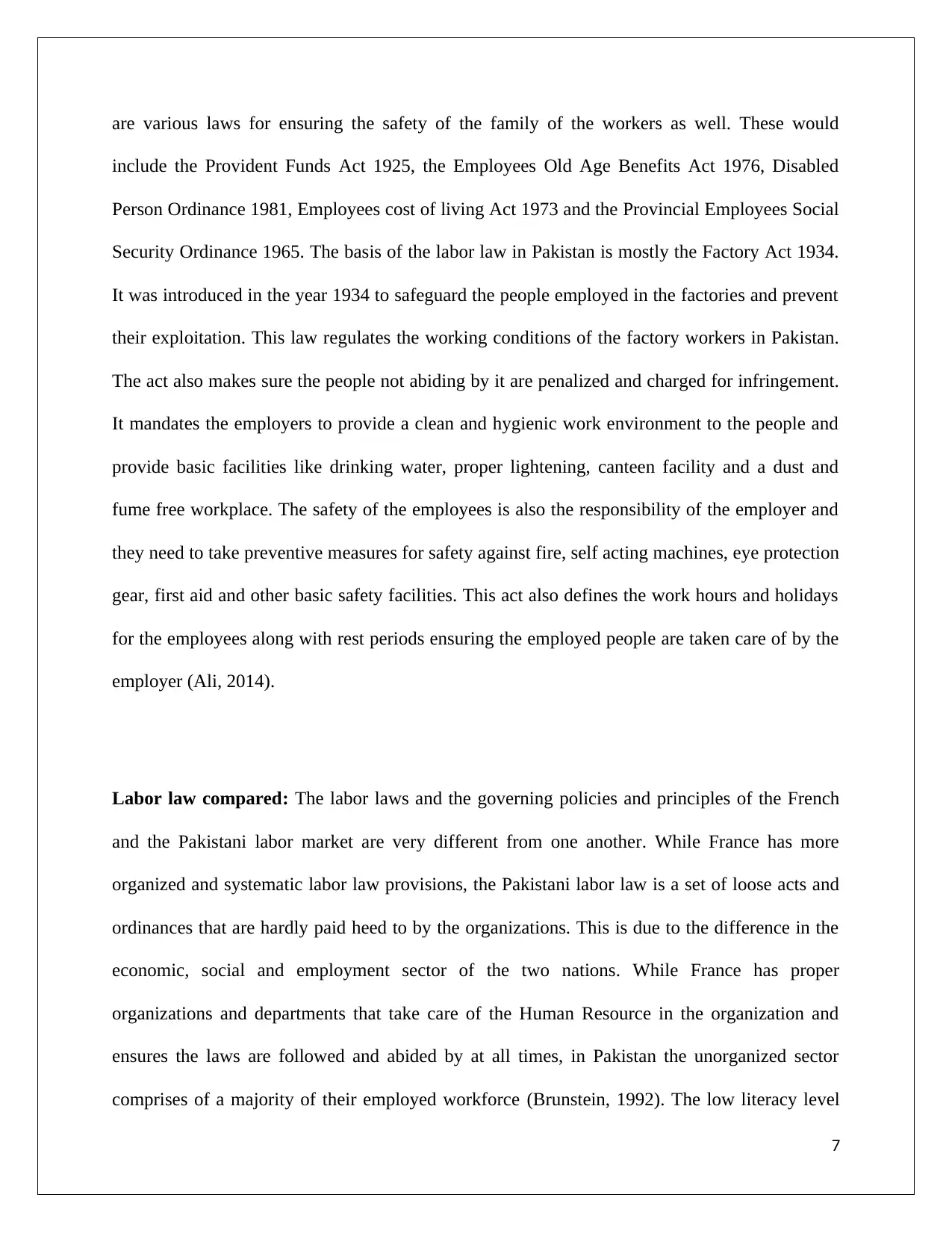
are various laws for ensuring the safety of the family of the workers as well. These would
include the Provident Funds Act 1925, the Employees Old Age Benefits Act 1976, Disabled
Person Ordinance 1981, Employees cost of living Act 1973 and the Provincial Employees Social
Security Ordinance 1965. The basis of the labor law in Pakistan is mostly the Factory Act 1934.
It was introduced in the year 1934 to safeguard the people employed in the factories and prevent
their exploitation. This law regulates the working conditions of the factory workers in Pakistan.
The act also makes sure the people not abiding by it are penalized and charged for infringement.
It mandates the employers to provide a clean and hygienic work environment to the people and
provide basic facilities like drinking water, proper lightening, canteen facility and a dust and
fume free workplace. The safety of the employees is also the responsibility of the employer and
they need to take preventive measures for safety against fire, self acting machines, eye protection
gear, first aid and other basic safety facilities. This act also defines the work hours and holidays
for the employees along with rest periods ensuring the employed people are taken care of by the
employer (Ali, 2014).
Labor law compared: The labor laws and the governing policies and principles of the French
and the Pakistani labor market are very different from one another. While France has more
organized and systematic labor law provisions, the Pakistani labor law is a set of loose acts and
ordinances that are hardly paid heed to by the organizations. This is due to the difference in the
economic, social and employment sector of the two nations. While France has proper
organizations and departments that take care of the Human Resource in the organization and
ensures the laws are followed and abided by at all times, in Pakistan the unorganized sector
comprises of a majority of their employed workforce (Brunstein, 1992). The low literacy level
7
include the Provident Funds Act 1925, the Employees Old Age Benefits Act 1976, Disabled
Person Ordinance 1981, Employees cost of living Act 1973 and the Provincial Employees Social
Security Ordinance 1965. The basis of the labor law in Pakistan is mostly the Factory Act 1934.
It was introduced in the year 1934 to safeguard the people employed in the factories and prevent
their exploitation. This law regulates the working conditions of the factory workers in Pakistan.
The act also makes sure the people not abiding by it are penalized and charged for infringement.
It mandates the employers to provide a clean and hygienic work environment to the people and
provide basic facilities like drinking water, proper lightening, canteen facility and a dust and
fume free workplace. The safety of the employees is also the responsibility of the employer and
they need to take preventive measures for safety against fire, self acting machines, eye protection
gear, first aid and other basic safety facilities. This act also defines the work hours and holidays
for the employees along with rest periods ensuring the employed people are taken care of by the
employer (Ali, 2014).
Labor law compared: The labor laws and the governing policies and principles of the French
and the Pakistani labor market are very different from one another. While France has more
organized and systematic labor law provisions, the Pakistani labor law is a set of loose acts and
ordinances that are hardly paid heed to by the organizations. This is due to the difference in the
economic, social and employment sector of the two nations. While France has proper
organizations and departments that take care of the Human Resource in the organization and
ensures the laws are followed and abided by at all times, in Pakistan the unorganized sector
comprises of a majority of their employed workforce (Brunstein, 1992). The low literacy level
7
Paraphrase This Document
Need a fresh take? Get an instant paraphrase of this document with our AI Paraphraser
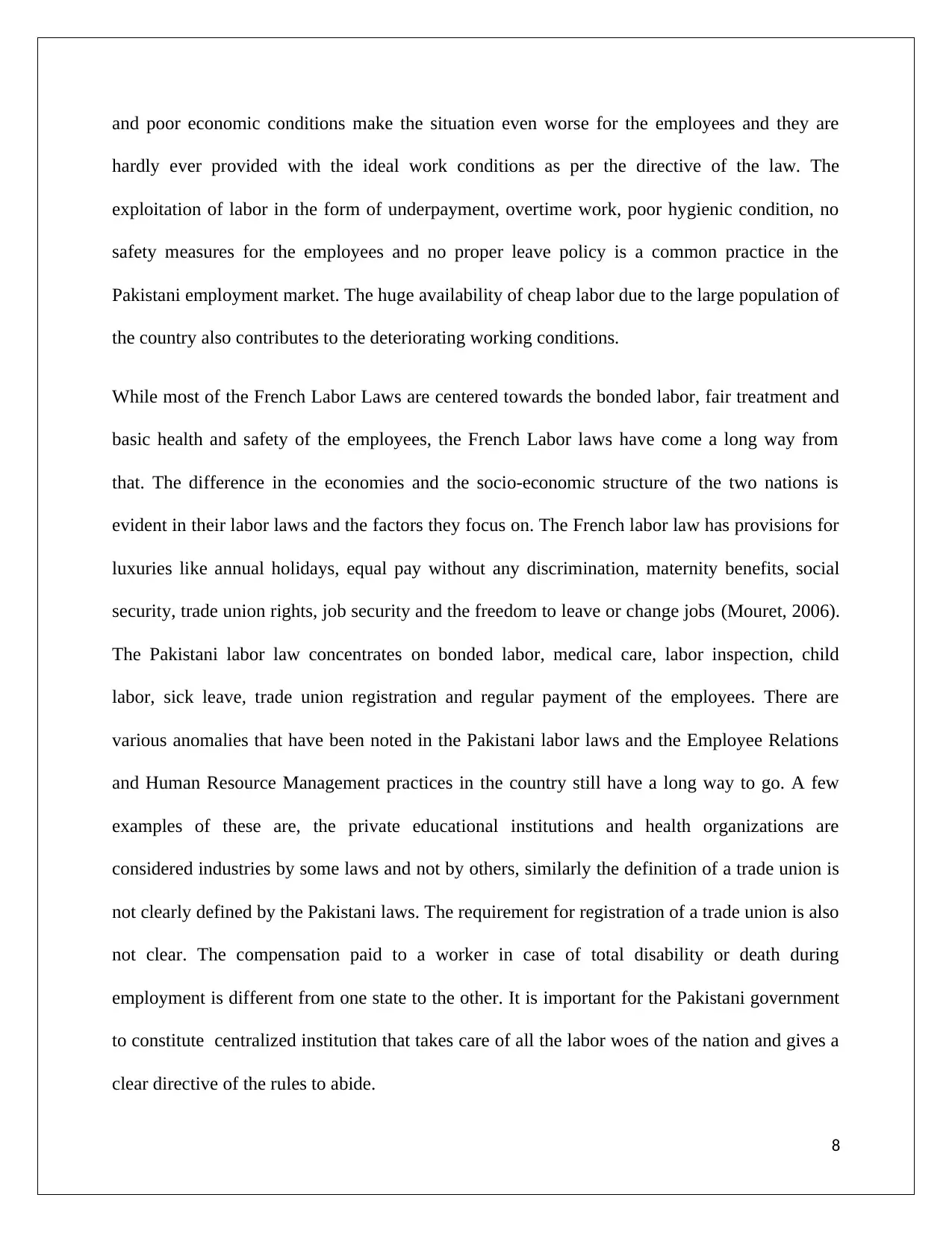
and poor economic conditions make the situation even worse for the employees and they are
hardly ever provided with the ideal work conditions as per the directive of the law. The
exploitation of labor in the form of underpayment, overtime work, poor hygienic condition, no
safety measures for the employees and no proper leave policy is a common practice in the
Pakistani employment market. The huge availability of cheap labor due to the large population of
the country also contributes to the deteriorating working conditions.
While most of the French Labor Laws are centered towards the bonded labor, fair treatment and
basic health and safety of the employees, the French Labor laws have come a long way from
that. The difference in the economies and the socio-economic structure of the two nations is
evident in their labor laws and the factors they focus on. The French labor law has provisions for
luxuries like annual holidays, equal pay without any discrimination, maternity benefits, social
security, trade union rights, job security and the freedom to leave or change jobs (Mouret, 2006).
The Pakistani labor law concentrates on bonded labor, medical care, labor inspection, child
labor, sick leave, trade union registration and regular payment of the employees. There are
various anomalies that have been noted in the Pakistani labor laws and the Employee Relations
and Human Resource Management practices in the country still have a long way to go. A few
examples of these are, the private educational institutions and health organizations are
considered industries by some laws and not by others, similarly the definition of a trade union is
not clearly defined by the Pakistani laws. The requirement for registration of a trade union is also
not clear. The compensation paid to a worker in case of total disability or death during
employment is different from one state to the other. It is important for the Pakistani government
to constitute centralized institution that takes care of all the labor woes of the nation and gives a
clear directive of the rules to abide.
8
hardly ever provided with the ideal work conditions as per the directive of the law. The
exploitation of labor in the form of underpayment, overtime work, poor hygienic condition, no
safety measures for the employees and no proper leave policy is a common practice in the
Pakistani employment market. The huge availability of cheap labor due to the large population of
the country also contributes to the deteriorating working conditions.
While most of the French Labor Laws are centered towards the bonded labor, fair treatment and
basic health and safety of the employees, the French Labor laws have come a long way from
that. The difference in the economies and the socio-economic structure of the two nations is
evident in their labor laws and the factors they focus on. The French labor law has provisions for
luxuries like annual holidays, equal pay without any discrimination, maternity benefits, social
security, trade union rights, job security and the freedom to leave or change jobs (Mouret, 2006).
The Pakistani labor law concentrates on bonded labor, medical care, labor inspection, child
labor, sick leave, trade union registration and regular payment of the employees. There are
various anomalies that have been noted in the Pakistani labor laws and the Employee Relations
and Human Resource Management practices in the country still have a long way to go. A few
examples of these are, the private educational institutions and health organizations are
considered industries by some laws and not by others, similarly the definition of a trade union is
not clearly defined by the Pakistani laws. The requirement for registration of a trade union is also
not clear. The compensation paid to a worker in case of total disability or death during
employment is different from one state to the other. It is important for the Pakistani government
to constitute centralized institution that takes care of all the labor woes of the nation and gives a
clear directive of the rules to abide.
8
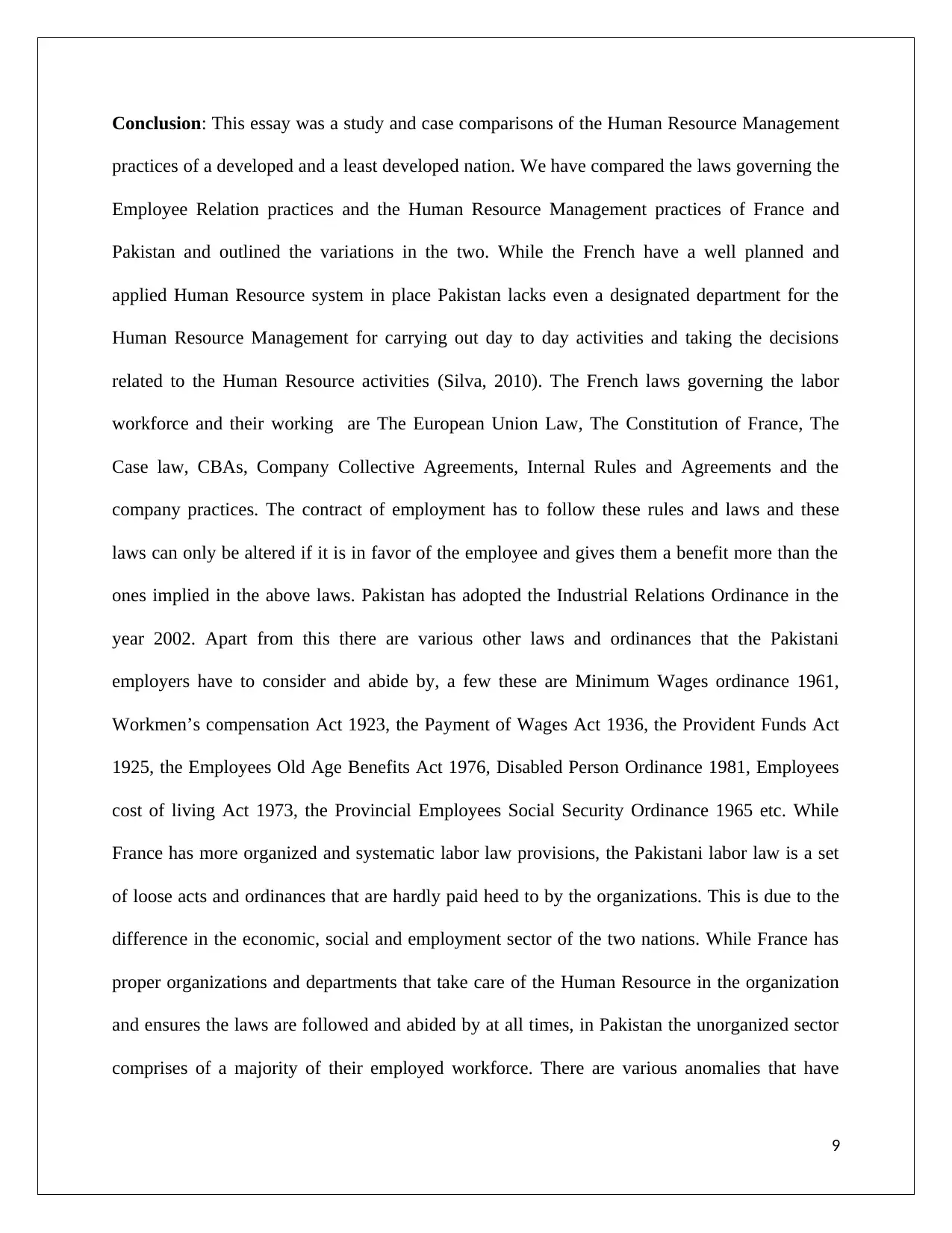
Conclusion: This essay was a study and case comparisons of the Human Resource Management
practices of a developed and a least developed nation. We have compared the laws governing the
Employee Relation practices and the Human Resource Management practices of France and
Pakistan and outlined the variations in the two. While the French have a well planned and
applied Human Resource system in place Pakistan lacks even a designated department for the
Human Resource Management for carrying out day to day activities and taking the decisions
related to the Human Resource activities (Silva, 2010). The French laws governing the labor
workforce and their working are The European Union Law, The Constitution of France, The
Case law, CBAs, Company Collective Agreements, Internal Rules and Agreements and the
company practices. The contract of employment has to follow these rules and laws and these
laws can only be altered if it is in favor of the employee and gives them a benefit more than the
ones implied in the above laws. Pakistan has adopted the Industrial Relations Ordinance in the
year 2002. Apart from this there are various other laws and ordinances that the Pakistani
employers have to consider and abide by, a few these are Minimum Wages ordinance 1961,
Workmen’s compensation Act 1923, the Payment of Wages Act 1936, the Provident Funds Act
1925, the Employees Old Age Benefits Act 1976, Disabled Person Ordinance 1981, Employees
cost of living Act 1973, the Provincial Employees Social Security Ordinance 1965 etc. While
France has more organized and systematic labor law provisions, the Pakistani labor law is a set
of loose acts and ordinances that are hardly paid heed to by the organizations. This is due to the
difference in the economic, social and employment sector of the two nations. While France has
proper organizations and departments that take care of the Human Resource in the organization
and ensures the laws are followed and abided by at all times, in Pakistan the unorganized sector
comprises of a majority of their employed workforce. There are various anomalies that have
9
practices of a developed and a least developed nation. We have compared the laws governing the
Employee Relation practices and the Human Resource Management practices of France and
Pakistan and outlined the variations in the two. While the French have a well planned and
applied Human Resource system in place Pakistan lacks even a designated department for the
Human Resource Management for carrying out day to day activities and taking the decisions
related to the Human Resource activities (Silva, 2010). The French laws governing the labor
workforce and their working are The European Union Law, The Constitution of France, The
Case law, CBAs, Company Collective Agreements, Internal Rules and Agreements and the
company practices. The contract of employment has to follow these rules and laws and these
laws can only be altered if it is in favor of the employee and gives them a benefit more than the
ones implied in the above laws. Pakistan has adopted the Industrial Relations Ordinance in the
year 2002. Apart from this there are various other laws and ordinances that the Pakistani
employers have to consider and abide by, a few these are Minimum Wages ordinance 1961,
Workmen’s compensation Act 1923, the Payment of Wages Act 1936, the Provident Funds Act
1925, the Employees Old Age Benefits Act 1976, Disabled Person Ordinance 1981, Employees
cost of living Act 1973, the Provincial Employees Social Security Ordinance 1965 etc. While
France has more organized and systematic labor law provisions, the Pakistani labor law is a set
of loose acts and ordinances that are hardly paid heed to by the organizations. This is due to the
difference in the economic, social and employment sector of the two nations. While France has
proper organizations and departments that take care of the Human Resource in the organization
and ensures the laws are followed and abided by at all times, in Pakistan the unorganized sector
comprises of a majority of their employed workforce. There are various anomalies that have
9
⊘ This is a preview!⊘
Do you want full access?
Subscribe today to unlock all pages.

Trusted by 1+ million students worldwide

been noted in the Pakistani labor laws and the Employee Relations and Human Resource
Management practices in the country still have a long way to go. The French have a more
organized, well planned and executed Human Resource practices. They give huge importance to
the Human Resource and have governing bodies and laws in place to ensure their safety and
requirements. The employee and employer relationship in a French organization is transactional
in nature. Both the employee and the employer treat each other with respect and the needs of
both of them are considered and taken care of by the laws. In Pakistan the employer and
employee relationship is that of a master and servant. This is clearly evident by the laws of the
Pakistani labor associations and their constitution that has to take measures to prevent the
exploitation of the employees by the employers.
10
Management practices in the country still have a long way to go. The French have a more
organized, well planned and executed Human Resource practices. They give huge importance to
the Human Resource and have governing bodies and laws in place to ensure their safety and
requirements. The employee and employer relationship in a French organization is transactional
in nature. Both the employee and the employer treat each other with respect and the needs of
both of them are considered and taken care of by the laws. In Pakistan the employer and
employee relationship is that of a master and servant. This is clearly evident by the laws of the
Pakistani labor associations and their constitution that has to take measures to prevent the
exploitation of the employees by the employers.
10
Paraphrase This Document
Need a fresh take? Get an instant paraphrase of this document with our AI Paraphraser

References
Ali, K. (2014). Status of Labour Rights in Pakistan. Pakistan Institute of Labour Education &
Research. Retrieved from
https://s3.amazonaws.com/s3.documentcloud.org/documents/2070301/status-labour-
rights-in-pakistan-the-year-2014.pdf
Associates, A. (2012). The labor law: General definitions and principles. Retrieved from
http://www.alaviandassociates.com/documents/labourlaw.pdf
Brunstein, i. (1992). Human Resource Management in France. Employee Relations, 14(4), 53-70.
Retrieved from http://www.emeraldinsight.com/doi/abs/10.1108/01425459210017621
Corbiere, A. (2012). Some paradoxes of French Labour Law. NEXO Labour Law Department.
Retrieved from
http://www.uiaflorence2014.com/public/pdf/006_SALA_203_DE_CORBI%C3%83%CB
%86RE_Arnaud_Foreign_Investment_EN_doc.pdf
Global, L. (2012). Employment Law Overview: France. Retrieved from
http://knowledge.leglobal.org/wp-content/uploads/LEGlobal_Memo_France.pdf
Latif, M. (2011). Application of Labour Laws in Pakistan. GC University. Retrieved from
http://www.icap.org.pk/wp-content/uploads/cpd/ppt/Presentation2_amend.pdf
Leat, M. (2011). Employee Relations. Heriot-Watt University . Retrieved from
https://www.ebsglobal.net/EBS/media/EBS/PDFs/Employee-Relations-Course-Taster.pdf
11
Ali, K. (2014). Status of Labour Rights in Pakistan. Pakistan Institute of Labour Education &
Research. Retrieved from
https://s3.amazonaws.com/s3.documentcloud.org/documents/2070301/status-labour-
rights-in-pakistan-the-year-2014.pdf
Associates, A. (2012). The labor law: General definitions and principles. Retrieved from
http://www.alaviandassociates.com/documents/labourlaw.pdf
Brunstein, i. (1992). Human Resource Management in France. Employee Relations, 14(4), 53-70.
Retrieved from http://www.emeraldinsight.com/doi/abs/10.1108/01425459210017621
Corbiere, A. (2012). Some paradoxes of French Labour Law. NEXO Labour Law Department.
Retrieved from
http://www.uiaflorence2014.com/public/pdf/006_SALA_203_DE_CORBI%C3%83%CB
%86RE_Arnaud_Foreign_Investment_EN_doc.pdf
Global, L. (2012). Employment Law Overview: France. Retrieved from
http://knowledge.leglobal.org/wp-content/uploads/LEGlobal_Memo_France.pdf
Latif, M. (2011). Application of Labour Laws in Pakistan. GC University. Retrieved from
http://www.icap.org.pk/wp-content/uploads/cpd/ppt/Presentation2_amend.pdf
Leat, M. (2011). Employee Relations. Heriot-Watt University . Retrieved from
https://www.ebsglobal.net/EBS/media/EBS/PDFs/Employee-Relations-Course-Taster.pdf
11

Lokiec, P. (2008). The Framework of French Labour Law and Recent Trends in Regulation.
University Paris X-Nanterre. Retrieved from
http://www.jil.go.jp/english/events/documents/clls04_lokiec1.pdf
Maluka, A. (2017). Pakistan: Employment & Labour Law 2017. Retrieved from
https://www.globallegalinsights.com/practice-areas/employment-and-labour-law/global-
legal-insights---employment-and-labour-law-2017-5th-ed./pakistan
Mouret, J. (2006). Collective Relations in France: A Multi-layered System in Mutation.
Retrieved from http://www.jil.go.jp/english/events/documents/clls06_03france.pdf
Paraire, L. (2017). France: Employment & Labour Law 2017. Retrieved from
https://www.globallegalinsights.com: https://www.globallegalinsights.com/practice-
areas/employment-and-labour-law/global-legal-insights---employment-and-labour-law-
2017-5th-ed./france
Rehman, A. (2011). Labor Laws of Pakistan. Retrieved from
http://www.highlykeen.com/images/Training%20BrochureLabor%20Laws%20of
%20Pakistan.pdf
Rizvi, A. (2013). Labour law in Pakistan. Retrieved from
http://www.riaabarkergillette.com/usa/wp-content/uploads/Labour-law-in-Pakistan.pdf
Silva, S. (2010). Human resource management, industrial relations and achieving management
objectives.
Stokes, A. (2009). An introduction to termination of employment in France. Retrieved from
http://www.laweurope-international.com/documents/men_04_practice_03_11.pdf
12
University Paris X-Nanterre. Retrieved from
http://www.jil.go.jp/english/events/documents/clls04_lokiec1.pdf
Maluka, A. (2017). Pakistan: Employment & Labour Law 2017. Retrieved from
https://www.globallegalinsights.com/practice-areas/employment-and-labour-law/global-
legal-insights---employment-and-labour-law-2017-5th-ed./pakistan
Mouret, J. (2006). Collective Relations in France: A Multi-layered System in Mutation.
Retrieved from http://www.jil.go.jp/english/events/documents/clls06_03france.pdf
Paraire, L. (2017). France: Employment & Labour Law 2017. Retrieved from
https://www.globallegalinsights.com: https://www.globallegalinsights.com/practice-
areas/employment-and-labour-law/global-legal-insights---employment-and-labour-law-
2017-5th-ed./france
Rehman, A. (2011). Labor Laws of Pakistan. Retrieved from
http://www.highlykeen.com/images/Training%20BrochureLabor%20Laws%20of
%20Pakistan.pdf
Rizvi, A. (2013). Labour law in Pakistan. Retrieved from
http://www.riaabarkergillette.com/usa/wp-content/uploads/Labour-law-in-Pakistan.pdf
Silva, S. (2010). Human resource management, industrial relations and achieving management
objectives.
Stokes, A. (2009). An introduction to termination of employment in France. Retrieved from
http://www.laweurope-international.com/documents/men_04_practice_03_11.pdf
12
⊘ This is a preview!⊘
Do you want full access?
Subscribe today to unlock all pages.

Trusted by 1+ million students worldwide
1 out of 13
Related Documents
Your All-in-One AI-Powered Toolkit for Academic Success.
+13062052269
info@desklib.com
Available 24*7 on WhatsApp / Email
![[object Object]](/_next/static/media/star-bottom.7253800d.svg)
Unlock your academic potential
Copyright © 2020–2025 A2Z Services. All Rights Reserved. Developed and managed by ZUCOL.





